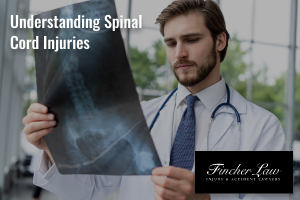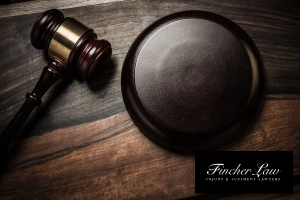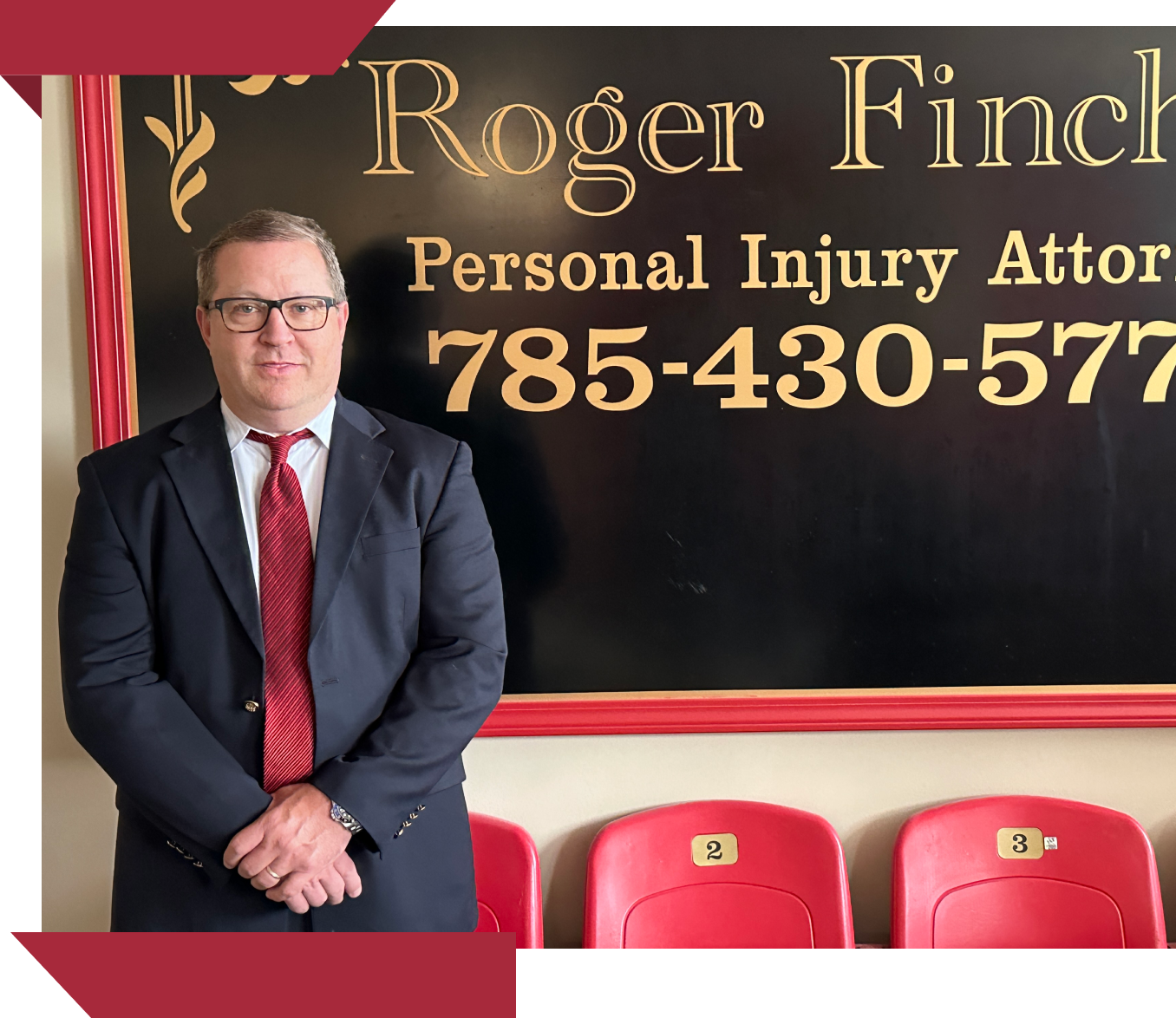
At Fincher Law, we know how serious spinal cord injuries can be. That's why we're here to help. Our team of dedicated spinal cord injury lawyers in Topeka has the expertise and compassion to guide you through this challenging time.
Our Topeka personal injury lawyer would be honored to review your case. Our personal injury lawyers thoroughly review every claim from each injury victim. We can recover compensation in personal injury cases, and we can negotiate with the insurance company as well.
A spinal cord injury can cause brief or irreversible paralysis, so seek medical care as soon as possible. Then, contact us to schedule a free case evaluation.

1. Expert Legal Guidance
Our attorneys have in-depth knowledge of spinal cord injury laws. We'll guide you through every decision, big and small. You can count on us for reliable and informed advice.
2. Case Evaluation and Strategy
We'll evaluate every detail of your case. We aim to maximize your compensation and will work relentlessly to build a strong case on your behalf.
3. Navigating Complex Legal Processes
Legal processes can be confusing, but you're not alone. We'll walk you through each step. We ensure you understand what's happening and why.
4. Negotiating with Insurance Companies
Dealing with insurance companies can be tricky. We won't let them undervalue your claim. Our aim is to get you the full compensation you're entitled to.
5. Alternative Dispute Resolution
Sometimes, court isn't the best option. We're skilled in alternative dispute resolution methods like mediation. These can be quicker and less stressful, and we'll advise on the best path for your case.
6. Courtroom Advocacy
If your case goes to trial, we're ready. We'll represent you confidently in court. Our attorneys will present your case powerfully. We'll fight for your rights and the justice you deserve.

Spinal cord injuries (SCIs) are severe and can impact every aspect of your life. They occur when there's damage to the spinal cord or nerves. This can result from car accidents, falls, medical malpractice, or diseases.
Damage to the sacral region of the spine can affect the hips, thighs, and lower parts of the body. You might experience loss of control over bowel and bladder functions. Movement in these areas can also be affected.
Sacral SCI often requires extensive rehabilitation. Physical therapy can facilitate the restoration of your strength and mobility. Occupational therapy may be needed to adapt to new ways of living.
Lumbar SCI impacts the lower back region. It may lead to a loss of function in the hips and legs. Bowel and bladder control may also be affected. Depending on the injury's severity, some may retain partial movement.
Treatment often involves surgery, followed by rehabilitation. Physical therapy is critical in recovery. It aims to improve mobility and strength. Support and adaptive equipment may be necessary for daily activities.
Thoracic SCI affects the middle part of the spine. It can result in paralysis of the lower body (paraplegia). This type of injury can also impact the torso and abdominal muscles. It can be life-altering, requiring significant adjustments.
Rehabilitation for thoracic SCI is comprehensive. It includes physical and occupational therapy. It often involves learning new ways to perform daily tasks.
Cervical SCI is an injury to the neck region of the spine. It's the most severe type of SCI. It can result in full or partial paralysis of the arms and legs (quadriplegia). Breathing assistance might be necessary.
Recovery and treatment are long-term and complex. It often involves surgery, extensive rehabilitation, and ongoing care. Emotional and psychological support are essential components of recovery.
1. Paralysis
Paralysis can happen with spinal cord injuries. It can be partial or complete. It affects mobility and independence. Living with paralysis requires significant lifestyle adjustments.
2. Loss of Sensation
Many with spinal injuries lose sensation in certain body parts. This can lead to unawareness of injuries or burns. It's essential to check these areas for any signs of damage regularly.
3. Bladder or Bowel Problems
SCI often affects bladder and bowel control. This may lead to significant complications. Managing these issues is an integral part of daily care.
4. Breathing Difficulties
Injuries, especially high on the spine, can affect breathing. Some may require ventilators or other aids. Respiratory care is crucial for those with these complications.
5. Chronic Pain
Chronic pain is common after an SCI. It can be challenging to manage. Pain management strategies are essential for improving quality of life.
6. Blood Clots
Due to reduced mobility, blood clots are a risk. These can be serious, so they require immediate medical attention. Preventative measures and regular check-ups are important.
7. Depression and Anxiety
The emotional impact of an SCI is significant. Many experience depression and anxiety. Mental health support is vital for coping with these challenges.

A. Seek Medical Attention
Immediate medical care is crucial. It can prevent further damage. Always follow your doctor's advice for the best outcomes.
B. Document Everything
Keep detailed records of the incident and your injuries. This includes medical reports and expenses. These documents are important for your case.
C. Keep Track of Expenses
Medical bills, therapy costs, and lost wages add up. Make sure to catalog all expenses related to your injury. These are crucial for your compensation claim.
D. Consult With an Attorney
A spinal cord injury attorney will walk you through the legal process. They can help you understand your rights and options. Legal advice is key to getting the compensation you deserve.
E. Follow Medical Advice
Adhering to your treatment plan is crucial for recovery. Always follow your medical team's instructions. This helps in both your physical and legal recovery process.
F. Be Cautious with Insurance Companies
Insurance companies may try to minimize your claim. Be careful what you say to them. Always consult your lawyer before making statements or accepting offers.

In Topeka, spinal cord injury cases fall under personal injury law. This means you may be entitled to compensation if someone else's negligence caused your injury. We may be able to help you recover compensation for any medical bills or lost pay.
A. Personal Injury Claims
If someone's careless or reckless actions led to your injury, you might have a personal injury claim. This can include car accidents, falls, or workplace injuries. Proving the other party's negligence is key to your case.
B. Product Liability
Sometimes, spinal injuries result from defective products. This could be a faulty car seat or a defective piece of equipment. In such cases, you might have a product liability claim against the manufacturer.
The statute of limitations in Kansas for personal injury claims, including spinal cord injuries, is generally two years from the date of the injury. This means you have two years to file a lawsuit. It's crucial to act promptly to ensure you don't miss this deadline.
Insurance claims are often the first step in seeking compensation. It's important to understand what your insurance covers. Negotiating with insurance companies can be challenging. They often aim to settle for less than you deserve. An attorney can negotiate for you to ensure fair compensation.
Sometimes, settling with insurance is not enough. If your needs exceed what insurance covers, a lawsuit might be necessary. This involves presenting your case in court.
To emerge victorious in a spinal cord injury case in Topeka, you need to prove the other party was negligent. This means they failed to act with reasonable care, and this led to your injury. Proving negligence is a four-step process.
Everyone has a duty to act in a way that doesn't harm others. For example, drivers must follow traffic laws. Business owners must keep their premises safe. The first step is to show that the defendant was required to show you a duty of care.
Fulfilling this duty is a legal responsibility. Whether it's driving safely or maintaining a hazard-free environment, the duty is clear. When someone violates this duty, they can be held accountable. Showing this breach is a critical part of your case.
The next step is proving the defendant breached their duty. This could be through an act or a failure to act. For example, a driver texting while driving is a breach of duty. Similarly, a store owner ignoring a spill on the floor breaches their duty.
This breach must be the direct cause of your injury. It can't be something unrelated. The link between their actions and your injury must be clear. This connection is essential for your claim.
It's not enough to show that the duty was breached. You must also prove that you suffered an injury. This injury must be a direct result of the breach. Medical records, photos, and witness statements can support your claim.
Your injury can be physical, emotional, or financial. It's important to document every aspect. This documentation strengthens your case and supports your claim for compensation.
Finally, you need to show causation. This means proving that your injury wouldn't have happened if not for the defendant's breach. It's about connecting the dots between their actions and your injury.
Causation can sometimes be the most challenging part to prove. However, it's crucial. It's the key to holding the other party accountable for your injury.
1. Eyewitnesses
People who saw the incident can provide valuable testimony. Their accounts can support your version of events. They can help prove the other party's fault.
2. Medical specialists
Doctors and medical experts can explain your injury (such as neck pain) and its causes. Their testimony is crucial in proving how the injury occurred. They can also attest to the severity of your injuries and discuss the medical treatment they provided.
3. Police officers
If the police were involved, their reports could be key evidence. They often contain details about the incident and observations at the scene. These reports can support your claim.
4. Accident reconstruction specialists
These experts can recreate the incident. They use science and technology to show what likely happened. Their findings can be powerful evidence in court. If you have a spinal cord injury, such as spinal stenosis, due to a car accident, this specialist is critical.
5. Financial experts
They can calculate your financial losses. This includes medical bills, lost wages, and other costs. Their analysis can support your claim for compensation.

Medical Expenses
You can claim for all medical costs related to your injury. This includes hospital stays, surgeries, medications, and rehab. Future medical expenses can also be included.
Lost Wages
If your injury caused you to miss work, you could claim lost wages. This also covers future earning capacity if you can't return to work. Compensation for lost wages helps ease financial burdens.
Pain and Suffering
This covers the physical and emotional pain caused by your injury. It's harder to quantify but equally important. It acknowledges the non-financial impact of your injury.
Wrongful Death
If a spinal cord injury leads to death, the family can commence a wrongful death claim. This can cover funeral expenses, loss of companionship, and other damages. It's a way to seek justice for your loved one.

Facing a spinal cord injury can feel overwhelming. But you don't have to face it alone. At Fincher Law, we're here to stand by your side. We offer a free consultation to discuss your case, where we'll answer your questions and explain your options.
Reach out to us today to schedule your free consultation.
Schedule Your
Free Consultation



How Can We Help You?
How Can We
Help You?
Schedule a Free Consultation Now By Contacting
Our Team at (785) 430-5770 or by completing the form below
Schedule a Free Consultation Now
By Contacting Our Team
at (785) 430-5770
"*" indicates required fields